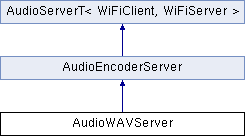A simple Arduino Webserver which streams the audio as WAV data. This class is based on the AudioEncodedServer class. All you need to do is to provide the data with a callback method or from a Stream. More...
#include <AudioServer.h>

Public Member Functions | |
| AudioWAVServer (const char *network, const char *password, int port=80) | |
| Construct a new Audio WAV Server object. | |
| AudioWAVServer (int port=80) | |
| Construct a new Audio WAV Server object We assume that the WiFi is already connected. | |
| ~AudioWAVServer () | |
| Destructor: release the allocated encoder. | |
| AudioEncoder * | audioEncoder () |
| bool | begin (AudioServerDataCallback cb, const char *contentType) |
| Start the server. The data must be provided by a callback method. | |
| bool | begin (AudioServerDataCallback cb, int sample_rate, int channels, int bits_per_sample=16) |
| Start the server. The data must be provided by a callback method. | |
| bool | begin (AudioStream &in, BaseConverter *converter=nullptr) |
| Start the server. You need to be connected to WiFI before calling this method. | |
| bool | begin (Stream &in, AudioInfo info, BaseConverter *converter=nullptr) |
| Start the server. You need to be connected to WiFI before calling this method. | |
| bool | begin (Stream &in, const char *contentType) |
| Start the server. You need to be connected to WiFI before calling this method. | |
| bool | begin (Stream &in, int sample_rate, int channels, int bits_per_sample=16, BaseConverter *converter=nullptr) |
| Start the server. You need to be connected to WiFI before calling this method. | |
| bool | copy () |
| Add this method to your loop Returns true while the client is connected. (The same functionality like doLoop()) | |
| bool | doLoop () |
| Add this method to your loop Returns true while the client is connected. | |
| bool | isClientConnected () |
| Checks if any clinent has connnected. | |
| Stream & | out () |
| Provides the output stream. | |
| Client * | out_ptr () |
| Provides a pointer to the WiFiClient. | |
| void | setConverter (BaseConverter *c) |
| defines a converter that will be used when the audio is rendered | |
| void | setCopyBufferSize (int size) |
| Changes the copy buffer size. | |
| WAVEncoder & | wavEncoder () |
Protected Member Functions | |
| void | connectWiFi () |
| void | processClient () |
| void | sendReplyContent () override |
| void | sendReplyHeader () override |
| void | setupServer (int port) |
Protected Attributes | |
| AudioInfo | audio_info |
| AudioServerDataCallback | callback = nullptr |
| Client | client_obj |
| const char * | content_type = nullptr |
| BaseConverter * | converter_ptr = nullptr |
| StreamCopy | copier |
| EncodedAudioOutput | encoded_stream |
| AudioEncoder * | encoder = nullptr |
| Stream * | in = nullptr |
| size_t | max_bytes = 0 |
| char * | network = nullptr |
| char * | password = nullptr |
| size_t | sent = 0 |
| Server | server |
Detailed Description
A simple Arduino Webserver which streams the audio as WAV data. This class is based on the AudioEncodedServer class. All you need to do is to provide the data with a callback method or from a Stream.
- Copyright
- GPLv3
Constructor & Destructor Documentation
◆ AudioWAVServer()
|
inline |
Construct a new Audio WAV Server object.
- Parameters
-
network password
Member Function Documentation
◆ begin() [1/6]
|
inlineinherited |
Start the server. The data must be provided by a callback method.
- Parameters
-
cb contentType Mime Type of result
◆ begin() [2/6]
|
inlineinherited |
Start the server. The data must be provided by a callback method.
- Parameters
-
cb sample_rate channels
◆ begin() [3/6]
|
inlineinherited |
Start the server. You need to be connected to WiFI before calling this method.
- Parameters
-
in converter
◆ begin() [4/6]
|
inlineinherited |
Start the server. You need to be connected to WiFI before calling this method.
- Parameters
-
in info converter
◆ begin() [5/6]
|
inlineinherited |
Start the server. You need to be connected to WiFI before calling this method.
- Parameters
-
in contentType Mime Type of result
◆ begin() [6/6]
|
inlineinherited |
Start the server. You need to be connected to WiFI before calling this method.
- Parameters
-
in sample_rate channels
◆ copy()
|
inlineinherited |
Add this method to your loop Returns true while the client is connected. (The same functionality like doLoop())
- Returns
- true
- false
◆ sendReplyContent()
|
inlineoverrideprotectedvirtualinherited |
Reimplemented from AudioServerT< Client, Server >.
◆ sendReplyHeader()
|
inlineoverrideprotectedvirtualinherited |
Reimplemented from AudioServerT< Client, Server >.
The documentation for this class was generated from the following file:
- src/AudioTools/CoreAudio/AudioHttp/AudioServer.h